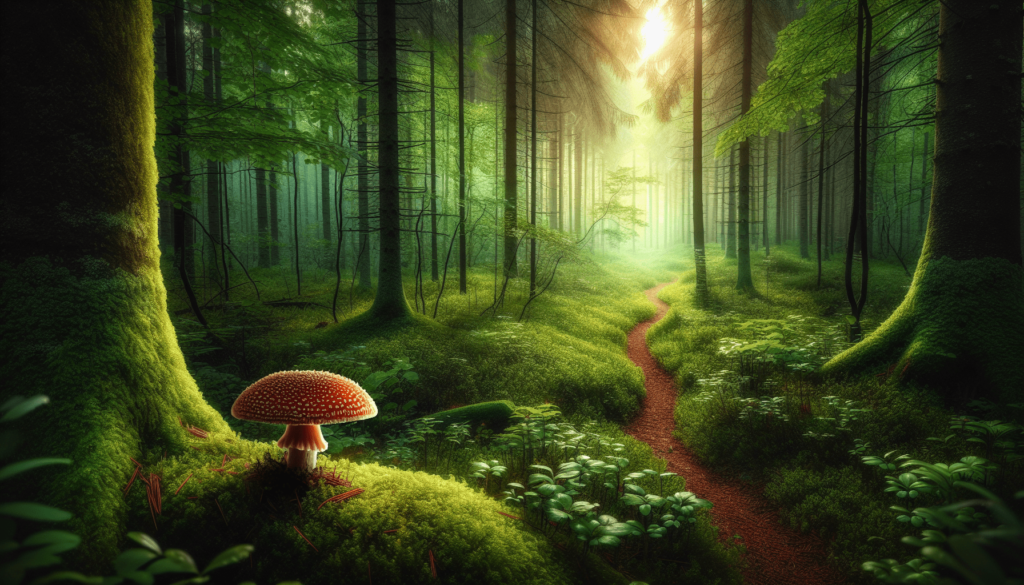Embark on a captivating journey through the lush forests and picturesque landscapes of the Baltic States – Estonia, Latvia, and Lithuania – as we explore the enchanting world of mushroom foraging. With a focus on regional spotlights, seasonal guides, safety and ethics, foraging techniques and tools, culinary and medicinal uses, community and culture, conservation and sustainability, as well as engaging narratives and personal stories, this article serves as your ultimate guide to uncovering the hidden treasures of mushroom foraging in the Baltic region. Get ready to immerse yourself in the wonders of nature and discover the magic that awaits beneath the forest canopy.
Foraging Locations
Dense Forests in Estonia
Estonia, with its vast forested areas, is a paradise for mushroom foragers. The dense forests, which cover more than half of the country’s territory, are home to a wide variety of mushrooms. Among the most sought-after species are the elusive morel mushrooms, known for their unique and delicate flavor. These mushrooms thrive in the damp, shaded areas of the forests, making spring the best time to forage for them. Some popular foraging spots in Estonia include Soomaa National Park, Lahemaa National Park, and the Taevaskoja Nature Reserve.
Rural Areas in Latvia
In Latvia, the mushroom foraging scene thrives in the rural areas, where vast meadows and wooded landscapes provide ideal conditions for mushroom growth. The diverse ecosystems in Latvia offer a wide range of mushroom species, but one of the highlights is the abundance of chanterelles during the summer months. These vibrant orange mushrooms are a culinary delicacy and add a unique flavor to various dishes. To forage for chanterelles in Latvia, head to the Gauja National Park, Kurzeme region, or the picturesque forests around Sigulda.
National Parks in Lithuania
Lithuania boasts several national parks that attract mushroom foragers from near and far. These protected areas not only offer stunning natural scenery but also provide a haven for mushroom biodiversity. Autumn is the perfect time to explore Lithuania’s national parks for one particular mushroom species: the porcini mushroom. Known for its meaty texture and rich flavor, the porcini mushroom can be found in abundance in the forests of Aukštaitija National Park, Curonian Spit National Park, and Žemaitija National Park.
Best Times to Forage
Spring for Morel Mushrooms
Spring is a magical time for mushroom foraging in the Baltic States, especially when it comes to hunting for morel mushrooms. Morels are highly prized for their distinct shape and flavor, and they tend to appear in the early spring when the weather starts to warm up. These mushrooms prefer damp, shaded areas, often near trees or fallen logs. To increase your chances of finding morels, explore the forest floors of Estonia, Latvia, and Lithuania during the months of April and May.
Summer for Chanterelles
As the Baltic States transition into the warmer months, the forests come alive with the vibrant golden colors of chanterelle mushrooms. These beautiful and delicious mushrooms thrive in the summer, particularly in Latvia. Chanterelles are commonly found in grassy areas, meadows, and woodland edges. They have a distinctive fruity aroma and add a delightful flavor to various dishes. July and August are the best months to venture into the forests and meadows of Latvia to find these prized mushrooms.
Autumn for Porcini Mushrooms
Autumn is a bountiful season for mushroom foragers, and one of the most sought-after mushrooms during this time is the porcini mushroom. With its meaty texture and earthy flavor, the porcini is a favorite for culinary enthusiasts. The Baltic States, with their diverse forests and national parks, offer excellent opportunities to find these mushrooms. Look for them near birch, oak, and pine trees, and explore the forests of Lithuania in September and October for the best chance of discovering these edible treasures.
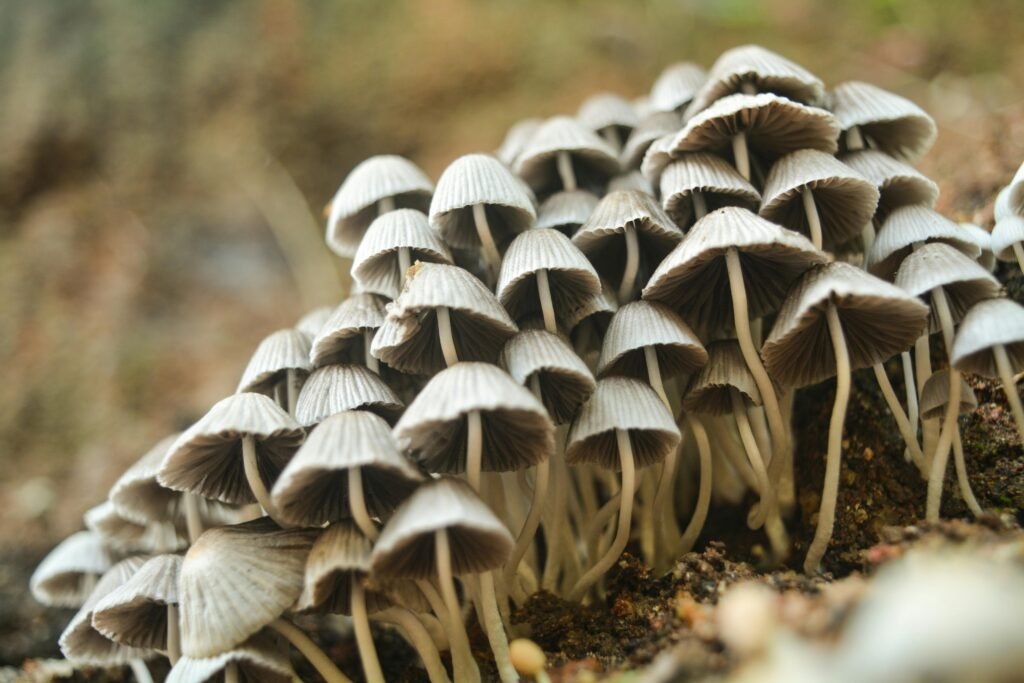
Safety and Ethics
Identifying Poisonous Mushrooms
When mushroom foraging, it is essential to be able to distinguish between edible and poisonous mushrooms. While the Baltic States are home to many edible species, there are also toxic ones that should be avoided. It is crucial to educate yourself about the identifying features of poisonous mushrooms and to only consume mushrooms that you are confident are safe. Always remember the golden rule of mushroom foraging: if in doubt, throw it out! Consult reputable field guides or seek guidance from experienced foragers to ensure your safety.
Avoiding Sensitive Ecosystems
Foraging responsibly means being mindful of the impact we have on the environment. When mushroom hunting in the Baltic States, it is important to avoid sensitive ecosystems such as protected areas, nature reserves, or fragile habitats. These areas play a vital role in maintaining biodiversity and should be respected. Stick to designated trails and paths, and be cautious not to damage vegetation or disturb wildlife while searching for mushrooms. By practicing responsible foraging, we can preserve these natural wonders for future generations.
Respecting Private Property
While there are many public lands and national parks that allow mushroom foraging, it is crucial to respect private property boundaries. Always seek permission before foraging on someone else’s land, as it is a matter of courtesy and legality. Building good relationships with landowners not only ensures a positive foraging experience but also helps foster a sense of community and respect for the environment. By practicing ethical foraging and obtaining proper permissions, we can help maintain a harmonious balance between nature and human activity.
Foraging Techniques
Proper Mushroom Harvesting
Harvesting mushrooms in a sustainable and responsible manner is essential to preserve the ecosystem and ensure the regeneration of mushroom populations. When harvesting mushrooms, it is important to use a sharp knife or scissors to cut the stem cleanly from the ground, leaving the mycelium undisturbed. Avoid pulling or uprooting the mushrooms, as this can damage the mycelial network. Additionally, only take what you need and leave some mushrooms behind to allow for spore dispersal and the growth of future generations.
Using Mushroom Guidebooks
Mushroom guidebooks are a valuable tool for both novice and experienced foragers. These books provide detailed descriptions, photographs, and information about various mushroom species, helping you accurately identify edible and poisonous mushrooms. When using guidebooks, pay close attention to the distinguishing features of each mushroom, such as cap shape, color, texture, and spore print. Carry a reliable guidebook with you while foraging in the Baltic States to enhance your knowledge and confidence in identifying different mushroom species.
Using Smartphone Identification Apps
In the digital age, smartphone apps can be a helpful companion for mushroom foragers. Mushroom identification apps utilize image recognition technology and detailed databases to help identify mushroom species from photographs. These apps can be particularly useful when encountering unfamiliar mushrooms in the field. However, it is important to use them as a supplementary tool and not solely rely on them for identification. Always cross-reference with field guides and consult experts to ensure accuracy and safety while foraging.
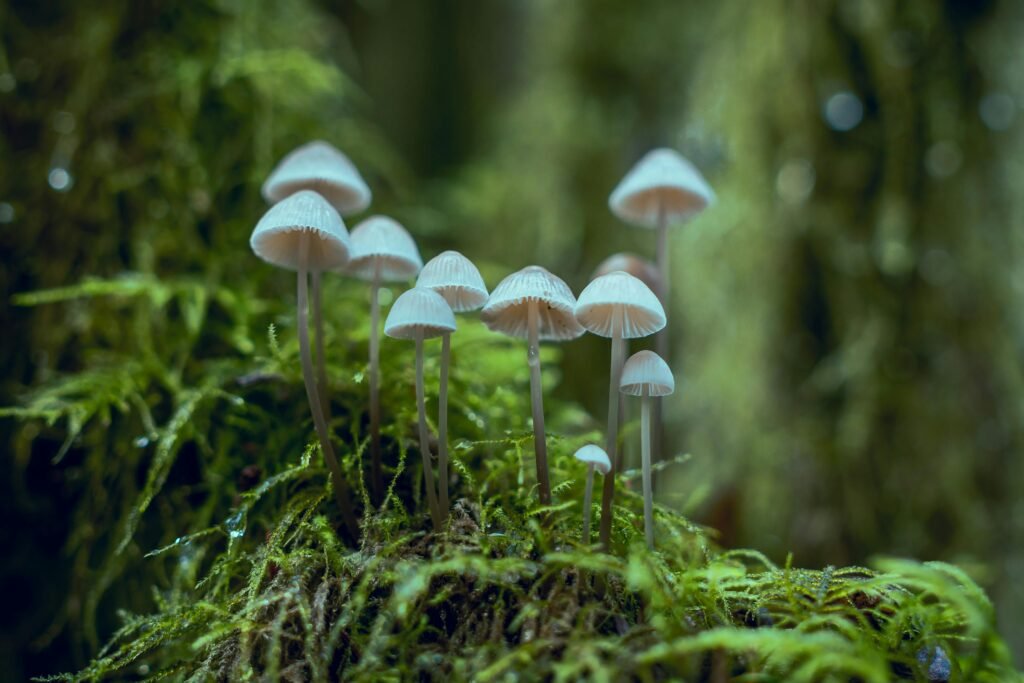
Culinary Uses
Traditional Mushroom Recipes
The culinary traditions of the Baltic States embrace the bountiful harvest of wild mushrooms. From hearty soups to savory pies and flavorful stews, mushrooms play a central role in traditional cuisine. Each country has its own unique recipes that highlight the rich and earthy flavors of locally foraged mushrooms. In Estonia, indulge in a comforting mushroom soup with freshly gathered morels. In Latvia, savor the taste of chanterelles in a creamy sauce served alongside traditional potato dishes. And in Lithuania, enjoy the robust flavors of porcini mushrooms in a traditional mushroom risotto.
Local Mushroom Culinary Festivals
Mushroom culinary festivals are a celebration of the diverse flavors and uses of mushrooms in the Baltic States. These festivals showcase the culinary heritage of the region, featuring cooking demonstrations, tastings, and competitions centered around mushrooms. One such festival is the Tartu Mushroom Days in Estonia, where visitors can learn about mushroom identification, sample delicious mushroom dishes, and participate in guided foraging tours. These festivals offer a unique opportunity to immerse yourself in the local gastronomy and indulge in the delights of mushroom-centric cuisine.
Popular Mushroom Dishes
In addition to traditional recipes and festivals, the Baltic States offer a wide array of popular mushroom dishes that cater to various tastes and preferences. Mushroom lovers can savor dishes such as stuffed mushrooms, mushroom risotto, mushroom-filled pastries, and creamy mushroom sauces. These dishes highlight the flavors and textures of different mushrooms found in the region. Whether you prefer the delicate flavor of morels, the fruity aroma of chanterelles, or the meaty richness of porcini mushrooms, the Baltic States have something to satisfy every mushroom enthusiast’s palate.
Medicinal Uses
Healing Properties of Baltic Mushrooms
Mushrooms have been used for centuries in traditional medicine for their healing properties, and the Baltic States are no exception when it comes to recognizing the medicinal value of mushrooms. Baltic mushrooms are known for their immune-boosting, anti-inflammatory, and antioxidant properties. For example, the chaga mushroom, found in the Baltic forests, is revered for its potential anti-cancer and immune-stimulating effects. Whether consumed in teas, extracts, or other forms, these medicinal mushrooms offer a natural approach to supporting overall well-being.
Traditional Medicinal Remedies
The Baltic States have a rich tradition of using mushrooms as medicinal remedies. These remedies have been passed down through generations, and certain mushrooms are believed to treat specific ailments. For instance, the birch polypore mushroom is traditionally used in Baltic folk medicine to promote wound healing and alleviate digestive disorders. The knowledge of these traditional medicinal remedies is deeply rooted in the local culture, and exploring the therapeutic uses of Baltic mushrooms can provide a deeper understanding of their significance beyond their culinary appeal.
Scientific Studies on Medicinal Mushrooms
In recent years, there has been a growing interest in the scientific community regarding the medicinal potential of mushrooms. Researchers in the Baltic States and around the world are conducting studies to explore the bioactive compounds and therapeutic benefits of various mushroom species. These studies aim to uncover the potential of mushrooms in areas such as cancer treatment, immune system modulation, and neuroprotection. By bridging traditional knowledge with scientific research, we can gain a more comprehensive understanding of the medicinal properties of Baltic mushrooms and their potential applications.
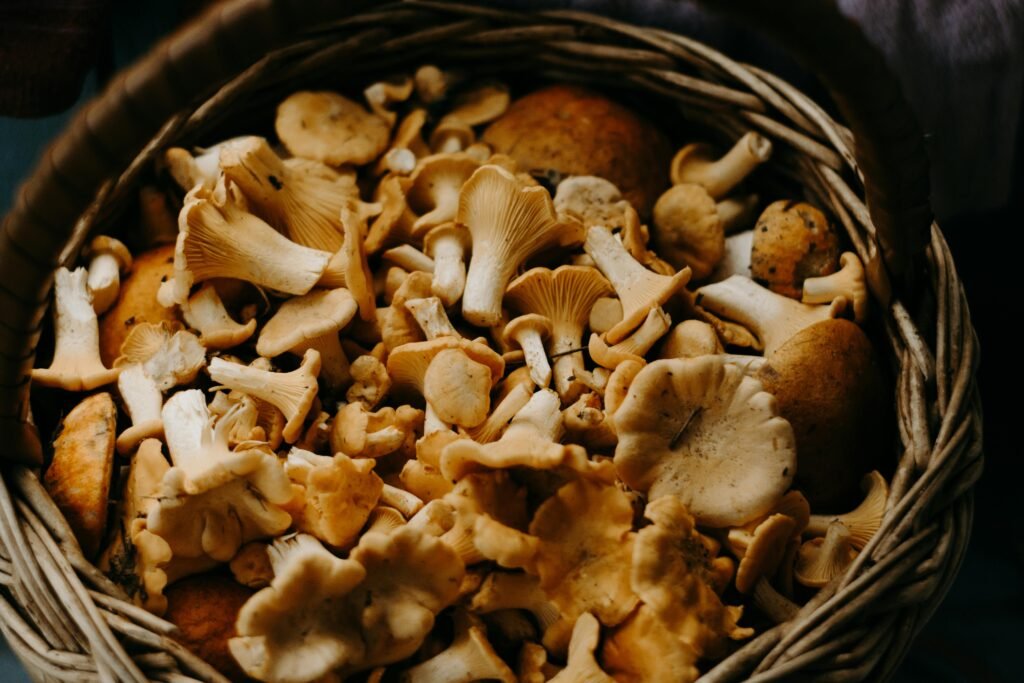
Mushroom Foraging Community
Mycology Workshops and Classes
For those looking to deepen their knowledge and skills in mushroom foraging, mycology workshops and classes offer valuable opportunities to learn from experts. These workshops cover topics such as mushroom identification, foraging techniques, and the ecological role of fungi. Whether you are a beginner or an experienced forager, participating in these workshops can enhance your understanding of mushroom biodiversity and foster a community of like-minded individuals passionate about fungi. Check local mycological societies and nature centers for upcoming workshops in the Baltic States.
Foraging Groups and Clubs
Connecting with other mushroom enthusiasts through foraging groups and clubs is a great way to share experiences, learn from each other, and expand your foraging network. These groups organize forays, outings, and educational events centered around mushroom foraging in the Baltic States. By joining a foraging group or club, you can tap into a wealth of collective knowledge, receive guidance from experienced foragers, and contribute to the preservation and sustainability of mushroom habitats. Engage with the vibrant foraging community in the Baltic States and embark on memorable foraging adventures together.
Annual Mushroom Foraging Festivals
Mushroom foraging festivals are not only a celebration of the abundant mushroom harvest but also a gathering of mushroom enthusiasts from all walks of life. The Baltic States host several annual mushroom foraging festivals that bring together locals and visitors alike. These festivals feature guided forays, workshops, lectures, and opportunities to taste and purchase a variety of mushrooms. Among the most renowned festivals in the region are the Mushroom Days in Vilnius, Lithuania, and the Mushroom Festival in Gauja National Park, Latvia. Immerse yourself in the lively atmosphere of these festivals and embrace the camaraderie of the mushroom foraging community.
Conservation and Sustainability
Importance of Fungal Ecology
Mushrooms are not only a culinary and medicinal treasure but also play a crucial role in ecosystems as decomposers and symbiotic organisms. Understanding the ecology of fungi is essential for the conservation and sustainable management of mushroom habitats. By recognizing the interconnectedness of fungi with other organisms, we can appreciate their ecological importance and take steps to protect their habitats. Supporting research, conservation efforts, and education initiatives focused on fungal ecology in the Baltic States contributes to the preservation of these delicate ecosystems.
Protecting Endangered Mushroom Species
Just like any other organism, mushrooms can face the threat of extinction due to habitat loss, overharvesting, and environmental degradation. In the Baltic States, there are several mushroom species that are considered rare or endangered. It is crucial to protect these species by conserving their habitats, practicing sustainable foraging practices, and promoting awareness about their importance. By prioritizing the preservation of endangered mushroom species, we can contribute to the overall conservation of biodiversity in the Baltic States.
Promoting Sustainable Foraging Practices
Sustainable foraging practices are vital to ensure the long-term health and productivity of mushroom habitats. When foraging in the Baltic States, consider the following practices to minimize your impact: collect mushrooms in a selective manner, leaving some behind for spore dispersal and future growth; avoid damaging the mycelial network by gently harvesting mushrooms; adhere to local regulations and respect landowners’ rights; and spread awareness about sustainable foraging practices within the mushroom foraging community. By adopting these practices, we can enjoy the bounty of nature while preserving the delicate balance of mushroom ecosystems.
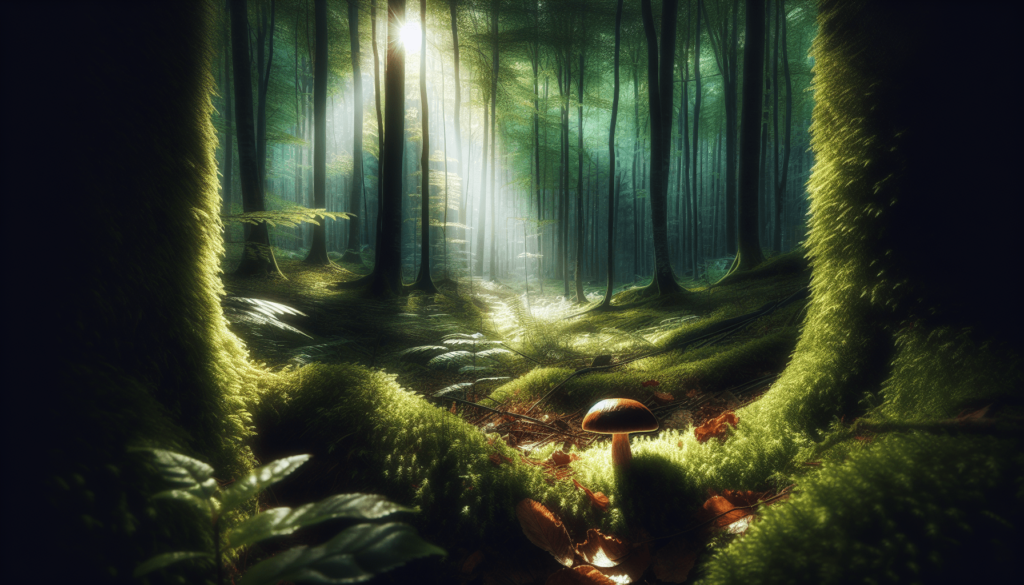
Personal Stories and Experiences
Expert Forager Interviews
To gain insights from experienced foragers, mycologists, and local experts, it is valuable to delve into their personal stories and experiences. These individuals have spent years honing their skills and cultivating a deep connection with mushrooms and their natural habitats. Through interviews, we can learn about their foraging journeys, the challenges they have faced, and the wisdom they have gained over time. By listening to these stories, we can be inspired, encouraged, and guided on our own mushroom foraging adventures in the Baltic States.
Local Foraging Adventures
Exploring the Baltic States through the lens of a mushroom forager opens up a world of unique and unforgettable experiences. From wandering through moss-covered forests to stumbling upon hidden mushroom treasures, each foraging adventure is filled with surprises and discoveries. Whether you choose to embark on a solo expedition or join a guided foray, the Baltic States offer captivating landscapes and diverse ecosystems that are waiting to be explored. Create your own stories and make lifelong memories as you dive into the enchanting world of mushroom foraging in Estonia, Latvia, and Lithuania.
Mushroom Foraging Tales
Mushroom foraging is not just about the mushrooms themselves; it is also about the stories that emerge from these immersive experiences. Tales of serendipitous encounters, unexpected friendships, and moments of awe and wonder are interwoven into the fabric of mushroom foraging in the Baltic States. These tales capture the essence of the foraging journey, transcending the act of collecting mushrooms to encompass the profound connections forged between humans and nature. Listen to the tales of fellow foragers, share your own stories, and keep the spirit of mushroom foraging alive.
Conclusion
Encouraging Readers to Explore the Baltic States
With their diverse landscapes, abundant forests, and thriving mushroom populations, the Baltic States offer a captivating destination for mushroom foragers of all levels of experience. From the dense forests of Estonia to the rural areas of Latvia and the national parks of Lithuania, each country brings its own unique charm and bountiful mushroom harvest. Whether you are a seasoned forager or a beginner, the Baltic States beckon you to embark on a mushroom foraging adventure filled with natural wonders and cultural richness.
Embracing the Beauty of Mushroom Foraging
Mushroom foraging in the Baltic States is not just a hobby; it is a way to connect with nature, embrace the beauty of the forest, and awaken a sense of wonder within ourselves. It is an invitation to slow down, observe the intricate details of the natural world, and savor the simple joys of discovery. As you venture into the forests, meadows, and national parks of Estonia, Latvia, and Lithuania, be open to the unexpected, be curious about the stories that mushrooms have to tell, and be ready to forge your own unique connection with these mystical organisms.
Promoting Responsible Foraging
While mushroom foraging is a rewarding and enriching activity, it is crucial to approach it with a sense of responsibility and respect for the environment. By following sustainable foraging practices, learning about proper identification, and understanding the ecological role of mushrooms, we can ensure the longevity of these delicate ecosystems. As members of the global mushroom foraging community, let us unite in our commitment to preserving nature’s gifts, fostering a culture of awareness and stewardship, and promoting responsible foraging practices in the Baltic States and beyond.
